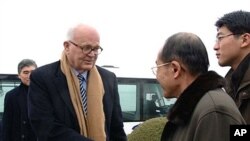U.S. envoy Stephen Bosworth is in Pyongyang to determine North Korea's readiness to return to the Chinese-sponsored six-party nuclear talks.
But a senior State Department official says that given Pyongyang's record on such matters, it may take more than one round of talks to determine if the negotiations, stalled for more than a year, can be restarted.
Bosworth arrived in the North Korean capital with a small inter-agency team of U.S. officials Tuesday on the first visit of its kind since former U.S. nuclear envoy Christopher Hill went there in October of last year.
The senior official said despite recent conciliatory comments from Pyongyang, it would not be surprising if the North Korean response to Bosworth is indeterminate and that further consultations on a return to the nuclear talks are required.
The official said the Bosworth team was expected to begin meetings with North Korean officials late Tuesday, have a full day of talks Wednesday, and leave Pyongyang for Seoul Thursday to begin consultations with other parties to the negotiations.
He said for reasons of communications security, the U.S. envoy would not consult with administration officials on the outcome of the visit until he reached Seoul.
North Korea had indicated in advance of Bosworth's arrival that it wanted to discuss a peace treaty with the United States that would end the technical state of war that has existed since the end of the Korean conflict of the 1950's.
But at a news briefing, Assistant Secretary of State for Public Affairs P.J. Crowley said Bosworth's agenda is limited to trying to learn if Pyongyang will return to the six-party talks, and reaffirm its 2005 agreement to scrap its nuclear program in return for outside aid and diplomatic benefits.
Crowley said a peace treaty can be taken up under the framework of the six-party talks.
"We will make clear to them that should they return to the six-party process and should they reaffirm their commitments under the 2005 joint communiqué, then there is available to them a robust channel for bilateral dialogue with which we can discuss a wide range of issues," he said. "On the issue of a peace treaty, obviously the United States is not the only party to that peace treaty. That would have to be done in a multi-lateral context."
North Korea shut down its nuclear reactor complex and was in the process of permanently disabling it last year when negotiations broke down. It subsequently expelled U.N. inspectors, quit the six-party process and tested a nuclear device, but it has lately softened its rhetoric and hinted it might rejoin the talks.
A State department official Monday said Bosworth would offer Pyongyang no new inducements for returning to the talks. He said if the North Korean answer to Bosworth is no, it will reinforce the international community's intention to strongly enforce U.N. sanctions against Pyongyang.
News
US: Immediate North Korean Decision on Nuclear Talks Unlikely
update

The State Department is cautioning against expectations of a breakthrough in U.S. envoy Stephen Bosworth's visit to North Korea aimed at getting Pyongyang back to multi-lateral negotiations on its nuclear program. Bosworth's visit which began Tuesday is the first high-level dialogue between the Obama administration and the communist state.



